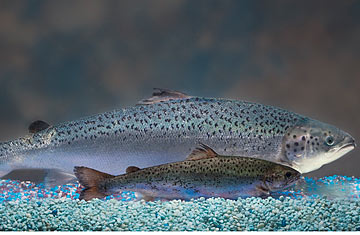
A genetically engineered salmon, rear, beside an Atlantic salmon of the same age
Farmed salmon is never as good as wild salmon. Everybody knows that. The taste is duller, the flesh flabbier, the finish forgettable. If I could, I would only eat wild salmon. But I can't in good conscience, any more than I can keep eating wild bluefin tuna. With wild populations getting wiped out by overfishing, I know that I have to start eating farmed salmon if I want to gobble its rich, vivid, ineffable flavor in my dotage. I just want it to taste better. So every advance in salmon farming comes as good news to me. That was my thought when I read, in predictably sensationalistic terms, of the new genetically modified chinook being looked at by the FDA. The salmon, which contains DNA from an eel-like critter called an ocean pout, grows twice as fast as an ordinary salmon. If the FDA gives it a green light, it will be the first genetically modified animal approved for human consumption. But if the FDA bans it, future genetic-aquaculture research might be discouraged. Naturally, the idea of a fast-growing fish with modified DNA inspired hysteria in the media, with both Gawker and the Huffington Post using the Frankenfish moniker in their headlines. (Like -zilla or from hell, Franken- is a lazy gag that has been on borrowed time for years, kept alive only by the unimaginative.)
In the kind of felicitous coincidence all too rare in the life of writers, as I was musing on genetically modified salmon I happened to come across a story in the New York Times about another advance in aquaculture, the science of raising fish. A major advance had been found in the breeding of the very beast that I had held up as aquaculture's reason for being: the direly threatened bluefin itself. Tellingly, even this breakthrough, which was free from any scary DNA techniques — or even, for that matter, hormones — prompted the usual grave predictions. The Times quotes Saskia Richartz of Greenpeace as saying bluefin tuna "is a luxury product, and this is tantamount to breeding elephants in captivity for their ivory." Which misses the point completely — had somebody bred elephants for their ivory, there would be a hell of a lot more elephants around today. Richartz appears to object to aquaculture generally, saying it "would rely on huge amounts of feed and antibiotics to keep farmed tuna from pests, which is not good for the environment."
She might well be right about that. To get that conscience-free slice of sashimi, semiopaque, slicked with soy and quivering with rich mouthfeel, a lot of technical problems have to be solved. Tuna are hard to feed. Maybe fish farms will create a new niche for an environmentally destructive organism, like the evil varoa mite that has been threatening the world's population of honeybees. Genetic engineering has a way of backfiring, even if it's not in the Island of Dr. Moreau scenarios conjured up by critics.
But the fact is that, whether through DNA modification, artificial insemination, antibiotics or any other technique, high-tech aquaculture is the only way to save the planet's marine life. The genetically modified salmon aren't going to jump into the rivers and take over native ecosystems; they're bred inland, in tanks; even if one engineered a Finding Nemo-style escape to the open ocean, it couldn't do anything, since they're all bred to be sterile. A lot of experts see no other way. "I think the wave of the future is land-based, recirculating self-cleaning systems," says Martin Schreibman, a City University of New York biologist who studies aquaculture. "We still have issues, we still have problems, and they should be looked at very closely. The FDA is right to do that. But [aquaculture] is the only way to go," he says. "We don't have a choice anymore."
His basis for these statements is well established. Fish species are the foundation for all ocean life, and no one can say what will happen to the world food chain if 90% of ocean life forms collapse, which is likely to happen by 2048, according to a study in the immensely prestigious journal Science. The main reason the study gave wasn't global warming, or the great Pacific garbage patch or toxic runoff from industrial production. The reason was overfishing. If fish can be bred in hatcheries on a commercially viable scale, it will help stave off a food-scarcity crisis larger than any the world has ever known. So it might be in our interest not to scoff and sneer quite so reflexively.
There's nothing wrong with modifying food to make it easier for us to grow. There are no black Angus cows grazing in the wild; they're the product of breeding for size, marbling and fast growth, not unlike the genetically modified salmon. If a farmed fish is bad for people, it needs to be banned until the problem is solved; but farming fish, in and of itself, is something that needs to be worked out — and soon. Eating the so-called "Frankenfish," however scary it may sound, is a small price to pay for saving the world. And who knows? Some day it might even taste as good as its wild cousins.
Josh Ozersky is a James Beard Award—winning food writer and the author of The Hamburger: A History. His food video site, Ozersky.TV, is updated daily. He is currently at work on a biography of Colonel Sanders.
